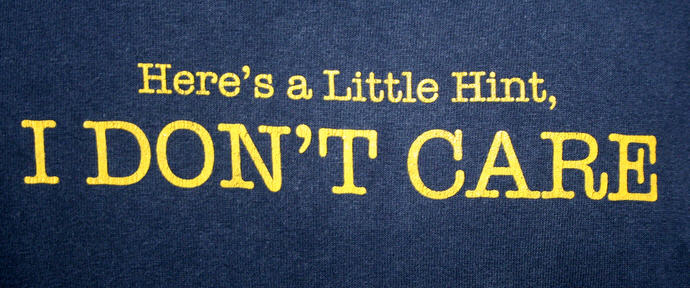
I don’t care about the environment.
We have had our Facebook page for a while now and it has certainly grown well given that we do not advertise. Yet, I have noticed that the really active people are not more a mere 1 percent. Does the rest care and do they even read the posts?
What is it that makes people care about the environment and helps them walk the talk instead of just sit around and do nothing?
Going back to our article, Communicating Climate Change – Where Did Scientists Go Wrong?, it seems that communicating environmental challenges has scared rather than inspired. Could we solve that challenge and empower the masses to act and live more sustainably?
In his article “I don’t care about the environment”, Derrick Mains, CEO of GreenNurture, talks about the feasibility of inspiring and motivating people to make a change. He discusses the phenomenon of positive reinforcement on “slacktivists” and just any person trying to do the right thing.
***
A few months ago I sat on a panel in front of a group of respected environmentalists and business leaders to answer a question: “How do we get people to care about the environment?”.
My fellow panelists all gave great heartfelt answers about inspiring people and educating them about the damage we are doing to our planet. My answer was a bit more abrasive. “I don’t care if you care about the environment. I’d just like you to do something.”
'I don’t care if you care about the #environment. I’d just like you to do something to protect it.'Click To TweetGasps and follow-up questions, which consisted of, “How can you say that?” and, “You really don’t mean that, do you?.” Finally, the crowd simmered down and began to understand my point.
The truth is that opinions and beliefs aren’t all that important. What are important are the actions a person takes.
One would think that people who care more about a cause tend to do more, but a string of research shows otherwise. A group was asked about their commitment to the environment and whether it was their responsibility to pick up litter. 94 percent of the 500 people agreed that this did, indeed, fall on their shoulders.
A study in the Journal of Social Psychology tested their commitment. The research team scattered litter where the group would exit. A mere 2 percent of the group followed through with their agreement to pick up litter.
This isn’t activism, it’s “slacktivism.” Simply put, everyone likes to say they do the right thing but very few actually do it.
What’s the answer to this issue? Lather, rinse and repeat – repeat being the key word, here. Shampoo manufacturers figured out long ago that the word repeat is the key to more action.
Sure we need more activists, and I’d love for everyone to care the way I do, but the truth is: It ain’t gonna happen. We need people to learn the right steps to take (lather), take action (rinse) and continue down a path of social responsible action (repeat).
But how do you get someone to take action, to begin the shampoo ritual we are all more than familiar with, without having warm, fuzzy feelings toward the environment?
Rewards and recognition.
Financial Rewards – Limited
Financial rewards are a tool that The Boeing Company uses to incentivize creativity among employees. Through their Creative Edge Program, employees can earn between $50 and $250 just for suggesting an improvement. If the idea is adopted, they receive 1 to 2 percent of the first year net sales generated. One idea made one employee $32,000 richer, according to the authors of The Rudolph Factor: Finding the Bright Lights that Drive Innovation in Your Business. But money isn’t everything and most people did not really care or engage.
The best – and most motivating – part of the program, according to its participants, was the feeling in knowing that they could make a difference.
'The best way to #motivate someone is to give them the feeling of knowing that they could make a difference.'Click To Tweet“I don’t care about the environment” may then start becoming less of something they would say.
Recognition – Better
Recognition is a powerful tool. Think about it. All it takes is one person to say you look nice today for the shirt you are wearing to become your favorite. Or a compliment on the way you did your hair for you to start styling it that way more often. Sincere reinforcement goes a long way in adjusting behavior.
On my weekly radio show, we once asked the question:
“What is the smartest HR policy you have ever seen?”
One submission we received from Facebook was from a manager who is required to tell each employee two pieces of positive information about their work each week. It did more than wonders for morale and productivity. It actually has changed their managers from always identifying negatives to focusing attention on positives.
That’s a company that will make a difference.
As a manager, I have used this tactic for years to get the behavior I want. Commenting on how much you appreciate staffers staying late to get their work done (even when they don’t) tends to encourage them to do just that. Indeed, praising someone’s work goes a long way in improving it. We all know this stuff.
We just need to add it to our sustainability arsenal and recognize that not everyone is as interested as we are. Applauding someone for taking small steps is a great way to get them from A to B and getting them to C from B is much easier next time.
Applauding s/one for taking small steps is a great way to get them from A to B. Getting them from B to C is easier.Click To TweetI saw this a few years back when a hunting and fishing personality approached me to collaborate on educating his viewers about conservation in a way that they could understand and accept. Initially he was very gun shy (no pun intended) and hesitant to provide too much information. He had been raked over the coals by a number of other NGOs on this very project.
But I embraced him, recognizing that one of the most critical elements of a sportsman’s creed is protection of the wild spaces. In our conversations, we discussed how pollution affects the streams and rivers, how the encroachment of mankind is eliminating his hunting ground. In fact, he expressed that he saw the effects on the game and fish on a daily basis. That was the reason he wanted to do something. I certainly did not convince him to become a tree hugger/vegan like me. However, I can guarantee my support for his efforts has had a positive influence on him and his viewers.
The same is true at work as it is at home. There will always be someone who will become engaged and drive sustainability. Others who might just take an action or two.
Recognizing the efforts of the slacktivists will go a long way toward building a sustainable culture and getting them more active.
So the next time you see someone recycling, buying a green product, composting or printing on both sides, don’t focus so much on their stance on environmental issues but recognize the positive impact they are making.
Thank them.
Don’t focus so much on people's stance on environmental issues but recognize the positive impact they are making. Click To TweetIf they are a business, support them. Not only are they making the world better for themselves, they are making it better for all of us. Those actions are definitely something we need to repeat.
***
I whole-heartedly agree with Derrick. Praising people for the right could work miracles. If someone’s interests include carelessness, self-indulgence, over-consumption, and lethargy, there is little we can do. It does come down to someone’s ethical system and understanding of how this world works.
Indeed, people have limited choice due to the interests of different governments and mighty multinationals. Yet, I am confident that many people would, if recognizing alternatives, change their behaviors.
Credit: Excerpts from ‘I Don’t Care about the Environment’, Environmental Leader
Check out our articles on Global Warming: Undeniable, Greenwashing and Green Marketing, Pollution Infographic, Consumerism and the Pursuit of Happiness, Green is the New Red

